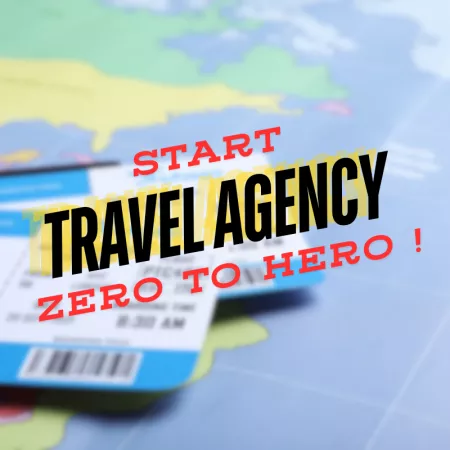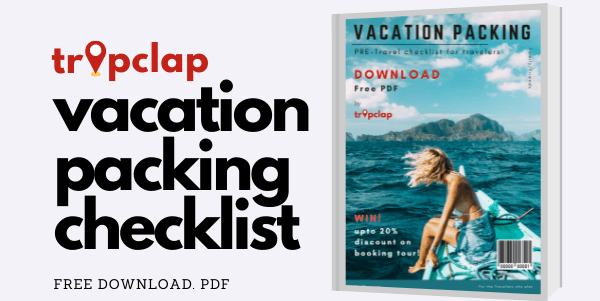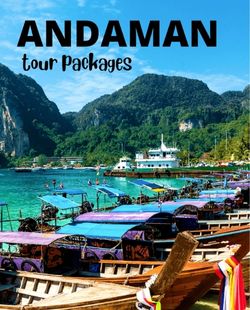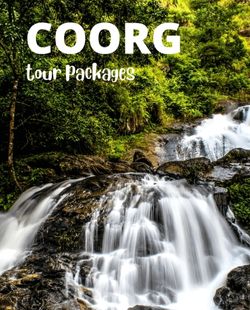How to Start a Travel Agency - From Zero to Hero
Learn how to start a travel agency with our detailed guide on licenses, permits, and business planning. Perfect for beginners!
Views : 1008

Starting a travel agency can be a rewarding business venture, offering opportunities to explore the world and help others plan their dream vacations. With the travel industry continually growing, there's a significant demand for knowledgeable and dedicated travel agents.
This comprehensive guide will walk you through everything you need to know about starting a travel agency, from market research to legal requirements, and from financial planning to marketing strategies.
Whether you're a seasoned traveler or new to the industry, this guide will provide you with the essential steps to launch and grow a successful travel agency.
Overview of the Travel Industry
 View Gallery - 10
View Gallery - 10 The travel industry is one of the largest and most dynamic sectors globally, encompassing a wide range of services such as transportation, accommodation, food and beverage, and various forms of entertainment and leisure activities.
According to the World Travel & Tourism Council (WTTC), the travel and tourism sector accounted for 10.4% of the global GDP in recent years, highlighting its economic significance. Despite challenges like the COVID-19 pandemic, the industry has shown resilience and adaptability, with a strong rebound as global travel restrictions ease and consumer confidence returns.
Key trends in the travel industry include the rise of experiential travel, where tourists seek unique and authentic experiences rather than conventional sightseeing.
Sustainable travel is also gaining momentum, with more travelers looking for eco-friendly options that minimize their environmental footprint.
Additionally, technological advancements are transforming the travel experience, from AI-driven personalized recommendations to virtual reality (VR) tours and contactless payments.
Why Start a Travel Agency?
 View Gallery - 10
View Gallery - 10 Starting a travel agency can be a fulfilling and profitable venture for several reasons:
1. Passion for Travel:
If you love exploring new destinations and helping others plan their perfect getaway, running a travel agency allows you to turn your passion into a profession. You'll get to share your travel experiences and expertise with clients, helping them create memorable journeys.
If you love exploring new destinations and helping others plan their perfect getaway, running a travel agency allows you to turn your passion into a profession. You'll get to share your travel experiences and expertise with clients, helping them create memorable journeys.
2. Growing Market:
The travel industry is steadily growing, with more people traveling for leisure, business, and other purposes. As the world becomes more connected, the demand for personalized travel services is increasing, providing ample opportunities for travel agents.
The travel industry is steadily growing, with more people traveling for leisure, business, and other purposes. As the world becomes more connected, the demand for personalized travel services is increasing, providing ample opportunities for travel agents.
3. Flexibility and Independence:
Owning a travel agency offers the flexibility to work from anywhere, be it a home office, a physical storefront, or even remotely while traveling. This independence allows you to set your own hours and create a work-life balance that suits your lifestyle.
Owning a travel agency offers the flexibility to work from anywhere, be it a home office, a physical storefront, or even remotely while traveling. This independence allows you to set your own hours and create a work-life balance that suits your lifestyle.
4. Diverse Clientele:
Travel agencies cater to a wide range of clients, from solo travelers and families to corporate groups and luxury vacationers. This diversity enables you to tailor your services to different market segments and niches, enhancing your business's resilience and profitability.
Travel agencies cater to a wide range of clients, from solo travelers and families to corporate groups and luxury vacationers. This diversity enables you to tailor your services to different market segments and niches, enhancing your business's resilience and profitability.
5. Access to Industry Perks:
As a travel agent, you'll have access to exclusive industry perks such as discounted travel rates, familiarization trips (FAM trips) to new destinations, and invitations to industry events. These benefits not only enhance your knowledge and experience but also provide valuable networking opportunities.
As a travel agent, you'll have access to exclusive industry perks such as discounted travel rates, familiarization trips (FAM trips) to new destinations, and invitations to industry events. These benefits not only enhance your knowledge and experience but also provide valuable networking opportunities.
6. Support and Resources:
There are numerous resources available to help you start and grow your travel agency, including industry associations, training programs, and technology platforms. Companies like Tripclap offer tools and services such as travel leads, itinerary builders, Travel CRM, and customizable travel agency websites, making it easier to manage and expand your business.
There are numerous resources available to help you start and grow your travel agency, including industry associations, training programs, and technology platforms. Companies like Tripclap offer tools and services such as travel leads, itinerary builders, Travel CRM, and customizable travel agency websites, making it easier to manage and expand your business.
Market Research and Business Planning
 View Gallery - 10
View Gallery - 10 1. Identifying Your Niche
Identifying a niche is a critical first step in starting a travel agency. A niche helps you focus your marketing efforts and differentiate your services in a crowded market. Here’s how to identify your niche:
Identifying a niche is a critical first step in starting a travel agency. A niche helps you focus your marketing efforts and differentiate your services in a crowded market. Here’s how to identify your niche:
1. Assess Your Interests and Expertise:
Consider your own travel experiences and interests. Are you passionate about adventure travel, luxury vacations, eco-tourism, or cultural tours? Your personal interests can guide you toward a niche you’ll enjoy and be knowledgeable about.
Consider your own travel experiences and interests. Are you passionate about adventure travel, luxury vacations, eco-tourism, or cultural tours? Your personal interests can guide you toward a niche you’ll enjoy and be knowledgeable about.
2. Research Market Demand:
Analyze current travel trends and demands. Look for gaps in the market where there is a growing demand but limited supply. For example, sustainable travel and wellness retreats are gaining popularity.
Analyze current travel trends and demands. Look for gaps in the market where there is a growing demand but limited supply. For example, sustainable travel and wellness retreats are gaining popularity.
3. Evaluate Your Target Audience:
Identify the demographics and preferences of your potential clients. Are you targeting solo travelers, families, millennials, seniors, or corporate clients? Understanding your target audience will help you tailor your services to meet their specific needs.
Identify the demographics and preferences of your potential clients. Are you targeting solo travelers, families, millennials, seniors, or corporate clients? Understanding your target audience will help you tailor your services to meet their specific needs.
4. Consider Profitability:
Ensure that your chosen niche is financially viable. Some niches may have high demand but low profitability due to intense competition or low margins. Evaluate the potential for repeat business and referrals.
Ensure that your chosen niche is financially viable. Some niches may have high demand but low profitability due to intense competition or low margins. Evaluate the potential for repeat business and referrals.
2. Analyzing Competition
Understanding your competition is essential for positioning your travel agency effectively. Here’s how to conduct a competitive analysis:
Identify Competitors:
Understanding your competition is essential for positioning your travel agency effectively. Here’s how to conduct a competitive analysis:
Identify Competitors:
1. Identify both direct and indirect competitors:
Direct competitors offer similar services in your chosen niche, while indirect competitors may offer alternative solutions to the same customer needs.
2. Evaluate Their Offerings:
Analyze the services and packages your competitors offer. Look at their pricing, booking processes, customer service, and unique selling points. Identify what they do well and areas where they fall short.
Analyze the services and packages your competitors offer. Look at their pricing, booking processes, customer service, and unique selling points. Identify what they do well and areas where they fall short.
3. Analyze Their Marketing Strategies:
Examine how competitors market their services. Study their websites, social media presence, advertising campaigns, and customer reviews. This will give you insights into their strengths and weaknesses.
Examine how competitors market their services. Study their websites, social media presence, advertising campaigns, and customer reviews. This will give you insights into their strengths and weaknesses.
4. Identify Opportunities and Threats:
Based on your analysis, identify opportunities to differentiate your agency. This could be through superior customer service, exclusive partnerships, or innovative travel packages. Also, recognize potential threats, such as market saturation or changing consumer preferences.
Based on your analysis, identify opportunities to differentiate your agency. This could be through superior customer service, exclusive partnerships, or innovative travel packages. Also, recognize potential threats, such as market saturation or changing consumer preferences.
3. Crafting a Business Plan
A well-crafted business plan is essential for the success of your travel agency. It serves as a roadmap for your business and helps secure funding from investors or lenders. Here are the key components of a business plan:
A well-crafted business plan is essential for the success of your travel agency. It serves as a roadmap for your business and helps secure funding from investors or lenders. Here are the key components of a business plan:
1. Executive Summary:
Provide an overview of your business, including your mission statement, business model, and objectives. Summarize the key points of your plan, highlighting what makes your travel agency unique.
Provide an overview of your business, including your mission statement, business model, and objectives. Summarize the key points of your plan, highlighting what makes your travel agency unique.
2. Company Description:
Describe your travel agency in detail. Include information about your niche, target market, and the services you offer. Explain your business structure, ownership, and location.
Describe your travel agency in detail. Include information about your niche, target market, and the services you offer. Explain your business structure, ownership, and location.
3. Market Analysis:
Present your market research findings. Include data on industry trends, target market demographics, and competitive analysis. Demonstrate your understanding of the market and how you plan to position your agency.
Present your market research findings. Include data on industry trends, target market demographics, and competitive analysis. Demonstrate your understanding of the market and how you plan to position your agency.
4. Organization and Management:
Outline your business’s organizational structure. Detail the roles and responsibilities of your team, including management and key employees. Highlight any relevant experience or qualifications.
Outline your business’s organizational structure. Detail the roles and responsibilities of your team, including management and key employees. Highlight any relevant experience or qualifications.
5. Services and Products:
Describe the travel services and products you will offer. Explain how these services meet the needs of your target market. Include information on any partnerships with suppliers or vendors.
Describe the travel services and products you will offer. Explain how these services meet the needs of your target market. Include information on any partnerships with suppliers or vendors.
6. Marketing and Sales Strategy:
Detail your marketing and sales strategies. Explain how you will attract and retain customers, including your branding, promotional activities, and sales tactics. Include an analysis of your pricing strategy.
Detail your marketing and sales strategies. Explain how you will attract and retain customers, including your branding, promotional activities, and sales tactics. Include an analysis of your pricing strategy.
7. Funding Request:
If you are seeking funding, specify how much you need and how you plan to use it. Provide a detailed budget outlining startup costs, operational expenses, and projected revenue.
If you are seeking funding, specify how much you need and how you plan to use it. Provide a detailed budget outlining startup costs, operational expenses, and projected revenue.
8. Financial Projections:
Include financial projections for the next three to five years. Provide income statements, cash flow statements, and balance sheets. Use realistic assumptions based on your market research.
Include financial projections for the next three to five years. Provide income statements, cash flow statements, and balance sheets. Use realistic assumptions based on your market research.
9. Appendix:
Include any additional information that supports your business plan. This could be resumes, legal documents, detailed market studies, or other relevant data.
Include any additional information that supports your business plan. This could be resumes, legal documents, detailed market studies, or other relevant data.
Legal Requirements and Formalities
 View Gallery - 10
View Gallery - 10 1. Choosing Your Business Structure
Selecting the right business structure is a crucial decision when starting a travel agency, as it affects your legal liability, taxation, and management flexibility. Here are the common business structures:
Selecting the right business structure is a crucial decision when starting a travel agency, as it affects your legal liability, taxation, and management flexibility. Here are the common business structures:
1. Sole Proprietorship:
A sole proprietorship is the simplest and most common form of business ownership, where the business is owned and operated by a single individual.
A sole proprietorship is the simplest and most common form of business ownership, where the business is owned and operated by a single individual.
- Advantages: Easy to set up, complete control over the business, and simplified tax reporting.
- Disadvantages: Unlimited personal liability for business debts and obligations.
2. Partnership:
A partnership involves two or more individuals who share ownership of the business.
A partnership involves two or more individuals who share ownership of the business.
- Advantages: Shared financial commitment, combined skills and knowledge, and straightforward setup.
- Disadvantages: Joint liability for business debts, potential for conflicts, and shared profits.
3. Limited Liability Company (LLC):
An LLC is a hybrid structure that offers the liability protection of a corporation with the tax benefits and flexibility of a partnership.
An LLC is a hybrid structure that offers the liability protection of a corporation with the tax benefits and flexibility of a partnership.
- Advantages: Limited liability protection, pass-through taxation, and flexibility in management.
- Disadvantages: More complex to set up than a sole proprietorship or partnership, and may have higher startup costs.
4. Corporation:
A corporation is a separate legal entity owned by shareholders, offering the strongest protection against personal liability.
A corporation is a separate legal entity owned by shareholders, offering the strongest protection against personal liability.
- Advantages: Limited liability, ability to raise capital through stock, and perpetual existence.
- Disadvantages: More complex and expensive to set up and maintain, and subject to double taxation (corporate profits and shareholder dividends).
5. S Corporation:
An S Corporation is a special type of corporation that allows profits to pass through to the owners' personal income without being subject to corporate tax rates.
An S Corporation is a special type of corporation that allows profits to pass through to the owners' personal income without being subject to corporate tax rates.
- Advantages: Limited liability, pass-through taxation, and potential tax benefits.
- Disadvantages: Stricter operational processes and eligibility requirements.
2. Registering Your Business
Once you’ve chosen your business structure, the next step is to register your travel agency. The process varies depending on your location and business structure but generally includes the following steps:
Once you’ve chosen your business structure, the next step is to register your travel agency. The process varies depending on your location and business structure but generally includes the following steps:
1. Choose a Business Name:
Select a unique and memorable name for your travel agency. Ensure the name complies with your state’s naming requirements and isn’t already in use.
Select a unique and memorable name for your travel agency. Ensure the name complies with your state’s naming requirements and isn’t already in use.
2. Register Your Business Name:
- Sole Proprietorship/Partnership: If you operate under a name different from your own, you’ll need to register a "Doing Business As" (DBA) name.
- LLC/Corporation: Register your business name when you file your formation documents with the state.
3. Obtain an Employer Identification Number (EIN):
An EIN is required for tax purposes and is used to identify your business. You can apply for an EIN through the IRS website.
An EIN is required for tax purposes and is used to identify your business. You can apply for an EIN through the IRS website.
4. Register with State and Local Authorities:
Depending on your location, you may need to register your business with your state’s Department of Revenue or other local agencies to obtain necessary permits and licenses.
Depending on your location, you may need to register your business with your state’s Department of Revenue or other local agencies to obtain necessary permits and licenses.
3. Necessary Licenses and Permits
Starting a travel agency requires obtaining various licenses and permits to operate legally. The requirements can vary significantly by location, so it’s essential to research the specific regulations in your area:
India-Specific Licenses and Permits
1. GST Registration:
If your annual turnover exceeds the threshold limit (currently ₹20 lakhs for most states), you need to register for the Goods and Services Tax (GST). This allows you to collect and remit GST on your services.
If your annual turnover exceeds the threshold limit (currently ₹20 lakhs for most states), you need to register for the Goods and Services Tax (GST). This allows you to collect and remit GST on your services.
2. IATA Accreditation:
The International Air Transport Association (IATA) accreditation is necessary for booking international flights. It adds credibility to your agency and allows you to access various travel products and services.
The International Air Transport Association (IATA) accreditation is necessary for booking international flights. It adds credibility to your agency and allows you to access various travel products and services.
3. Travel Agent License from Ministry of Tourism:
The Ministry of Tourism in India offers a voluntary recognition scheme for travel agents. Obtaining this recognition can enhance your credibility and provide various benefits such as access to government promotional activities.
The Ministry of Tourism in India offers a voluntary recognition scheme for travel agents. Obtaining this recognition can enhance your credibility and provide various benefits such as access to government promotional activities.
4. Shop and Establishment Act License:
If you are operating a physical office, you need to register under the Shop and Establishment Act applicable in your state. This license regulates the working conditions and ensures compliance with labor laws.
If you are operating a physical office, you need to register under the Shop and Establishment Act applicable in your state. This license regulates the working conditions and ensures compliance with labor laws.
5. Import Export Code (IEC):
If you plan to offer international travel services, you might need an IEC from the Directorate General of Foreign Trade (DGFT). This code is necessary for any import/export business, including travel services involving foreign exchange.
If you plan to offer international travel services, you might need an IEC from the Directorate General of Foreign Trade (DGFT). This code is necessary for any import/export business, including travel services involving foreign exchange.
6. Professional Tax Registration:
Some states require you to register for professional tax if you have employees. This tax is deducted from employees’ salaries and remitted to the state government.
Some states require you to register for professional tax if you have employees. This tax is deducted from employees’ salaries and remitted to the state government.
7. Insurance:
While not mandatory, obtaining professional liability insurance (also known as Errors and Omissions insurance) is advisable. It protects your travel agency from potential lawsuits and claims related to the services you provide.
While not mandatory, obtaining professional liability insurance (also known as Errors and Omissions insurance) is advisable. It protects your travel agency from potential lawsuits and claims related to the services you provide.
Additional Details for Other Countries
- United States:
1. Business License: Most cities and counties require a general business license to operate legally within their jurisdiction.
2. Seller of Travel License: Some states require travel agencies to obtain a special license, often referred to as a "Seller of Travel" license. States with this requirement include California, Florida, Hawaii, Iowa, and Washington.
Federal Tax ID (EIN): An Employer Identification Number (EIN) is necessary for tax reporting and is used to identify your business with the IRS.
3. State Tax Registration: If your state has a sales tax, you’ll need to register for a state sales tax permit.
Zoning Permits: Ensure that your physical office complies with local zoning regulations.
Zoning Permits: Ensure that your physical office complies with local zoning regulations.
- United Kingdom:
1. ATOL License: The Air Travel Organiser's Licence (ATOL) is a legal requirement for UK travel agencies that sell air travel. It provides consumer protection in the event of the travel agency’s failure.
2. ABTA Membership: While not mandatory, being a member of the Association of British Travel Agents (ABTA) provides credibility and consumer protection.
Business Registration: Register your business with Companies House.
Business Registration: Register your business with Companies House.
- Australia:
1. Australian Business Number (ABN): You need to register for an ABN to operate a business in Australia.
2. Travel Agent License: While specific licensing requirements have been abolished in favor of a self-regulatory model, it’s beneficial to comply with the
Australian Federation of Travel Agents (AFTA) guidelines.
3. GST Registration: Register for Goods and Services Tax if your annual turnover exceeds the threshold.
- Canada:
1. TICO License: In Ontario, travel agencies must be licensed by the Travel Industry Council of Ontario (TICO).
2. Business Registration: Register your business with the appropriate provincial or territorial authority.
3. GST/HST Registration: Register for the Goods and Services Tax/Harmonized Sales Tax if your annual revenue exceeds the threshold.
Financial Planning and Funding
 View Gallery - 10
View Gallery - 10 1. Calculating Startup Costs
Accurately estimating your startup costs is crucial for securing funding and managing your finances effectively. Here are some common expenses to consider when starting a travel agency:
Accurately estimating your startup costs is crucial for securing funding and managing your finances effectively. Here are some common expenses to consider when starting a travel agency:
1. Business Registration and Licenses:
Fees for registering your business and obtaining necessary licenses and permits.
2. Office Space:
Costs for leasing or purchasing office space, or setting up a home office.
Costs for leasing or purchasing office space, or setting up a home office.
3. Office Equipment and Supplies:
Furniture, computers, printers, phones, and other necessary office supplies.
Furniture, computers, printers, phones, and other necessary office supplies.
4. Technology and Software:
Costs for travel booking software, customer relationship management (CRM) systems, and other essential software.
Costs for travel booking software, customer relationship management (CRM) systems, and other essential software.
5. Website Development:
Expenses for creating a professional website, including domain registration, hosting, and web design.
Expenses for creating a professional website, including domain registration, hosting, and web design.
6. Marketing and Advertising:
Initial costs for branding, creating marketing materials, and running advertising campaigns.
Initial costs for branding, creating marketing materials, and running advertising campaigns.
7. Professional Services:
- Fees for legal, accounting, and consulting services.
- Costs for business insurance, including professional liability insurance.
- Miscellaneous Expenses: Travel and training costs, membership fees for industry associations, and other incidental expenses.
It’s essential to create a detailed budget that outlines all these costs to ensure you have a clear understanding of the total investment required to launch your travel agency.
2. Funding Options
Once you have a clear picture of your startup costs, the next step is to explore funding options. Here are some common ways to finance your travel agency:
Once you have a clear picture of your startup costs, the next step is to explore funding options. Here are some common ways to finance your travel agency:
1. Personal Savings:
Using your personal savings is a common way to fund a new business. This approach minimizes debt and interest expenses but requires you to have sufficient savings set aside.
Using your personal savings is a common way to fund a new business. This approach minimizes debt and interest expenses but requires you to have sufficient savings set aside.
2. Friends and Family:
Borrowing money from friends and family can be a flexible and low-cost option. Ensure you have clear agreements in place to avoid misunderstandings.
Borrowing money from friends and family can be a flexible and low-cost option. Ensure you have clear agreements in place to avoid misunderstandings.
3. Bank Loans:
Traditional bank loans are a common source of funding. You’ll need a strong business plan and good credit history to qualify. Be prepared for interest rates and repayment terms.
Traditional bank loans are a common source of funding. You’ll need a strong business plan and good credit history to qualify. Be prepared for interest rates and repayment terms.
4. Small Business Administration (SBA) Loans:
SBA loans are government-backed loans that offer favorable terms for small businesses. These loans can be easier to obtain than traditional bank loans.
SBA loans are government-backed loans that offer favorable terms for small businesses. These loans can be easier to obtain than traditional bank loans.
5. Angel Investors:
Angel investors are individuals who provide capital for startups in exchange for ownership equity or convertible debt. This can be a good option if you’re willing to share ownership and decision-making.
Angel investors are individuals who provide capital for startups in exchange for ownership equity or convertible debt. This can be a good option if you’re willing to share ownership and decision-making.
6. Venture Capital:
Venture capital firms invest in high-growth potential businesses. This option is more suitable for larger startups with significant growth prospects and involves giving up a portion of your company’s equity.
Venture capital firms invest in high-growth potential businesses. This option is more suitable for larger startups with significant growth prospects and involves giving up a portion of your company’s equity.
7. Crowdfunding:
Crowdfunding platforms like Kickstarter and Indiegogo allow you to raise small amounts of money from a large number of people. This can be an effective way to test the market and gain initial funding.
Crowdfunding platforms like Kickstarter and Indiegogo allow you to raise small amounts of money from a large number of people. This can be an effective way to test the market and gain initial funding.
8. Grants and Competitions:
Some organizations offer grants and business plan competitions that provide funding without the need for repayment. Research available opportunities in your industry and region.
Some organizations offer grants and business plan competitions that provide funding without the need for repayment. Research available opportunities in your industry and region.
3. Financial Management
Effective financial management is critical to the success and sustainability of your travel agency. Here are some key practices to implement:
Effective financial management is critical to the success and sustainability of your travel agency. Here are some key practices to implement:
1. Budgeting and Forecasting:
Create a detailed budget that includes all projected income and expenses. Regularly update your budget to reflect actual performance and adjust forecasts as needed.
Create a detailed budget that includes all projected income and expenses. Regularly update your budget to reflect actual performance and adjust forecasts as needed.
2. Cash Flow Management:
Monitor your cash flow to ensure you have enough funds to cover operating expenses. Maintain a cash reserve to handle unexpected costs or slow periods.
Monitor your cash flow to ensure you have enough funds to cover operating expenses. Maintain a cash reserve to handle unexpected costs or slow periods.
3. Accounting and Bookkeeping:
Use accounting software to track your finances accurately. Consider hiring a professional accountant to manage your books and ensure compliance with tax regulations.
Use accounting software to track your finances accurately. Consider hiring a professional accountant to manage your books and ensure compliance with tax regulations.
4. Financial Reporting:
Regularly generate financial reports, such as income statements, balance sheets, and cash flow statements. These reports provide valuable insights into your business’s financial health and help identify areas for improvement.
Regularly generate financial reports, such as income statements, balance sheets, and cash flow statements. These reports provide valuable insights into your business’s financial health and help identify areas for improvement.
5. Cost Control:
Implement cost-control measures to minimize unnecessary expenses. Regularly review your spending and look for ways to reduce costs without compromising quality.
Implement cost-control measures to minimize unnecessary expenses. Regularly review your spending and look for ways to reduce costs without compromising quality.
6. Revenue Management:
Develop strategies to maximize your revenue, such as upselling additional services, creating attractive travel packages, and optimizing pricing.
Develop strategies to maximize your revenue, such as upselling additional services, creating attractive travel packages, and optimizing pricing.
7. Investment in Growth:
Allocate funds for marketing, technology upgrades, and staff training to support your business’s growth and competitiveness
Allocate funds for marketing, technology upgrades, and staff training to support your business’s growth and competitiveness
Setting Up Your Travel Agency
 View Gallery - 10
View Gallery - 10 1. Physical vs. Online Office
When setting up your travel agency, one of the first decisions you'll need to make is whether to operate from a physical office, an online office, or a combination of both. Each option has its own set of advantages and considerations:
When setting up your travel agency, one of the first decisions you'll need to make is whether to operate from a physical office, an online office, or a combination of both. Each option has its own set of advantages and considerations:
1. Physical Office:
Advantages:
- Tangible Presence: A physical office provides a professional and tangible presence that can build trust with clients.
- Walk-in Traffic: It allows for walk-in clients and face-to-face consultations, which can enhance customer service.
- Brand Visibility: A physical location can enhance brand visibility through signage and local marketing efforts.
Considerations:
- Higher Costs: Renting or purchasing office space, along with utilities and maintenance, can be expensive.
- Location: Choosing a convenient and accessible location is crucial for attracting clients.
- Staffing: You'll need to consider the cost of hiring and managing in-office staff.
2. Online Office:
Advantages:
- Lower Overhead: Operating online eliminates the need for physical office space, reducing costs.
- Flexibility: You can work from anywhere and offer flexible hours to accommodate clients in different time zones.
- Wider Reach: An online presence allows you to reach a global audience, expanding your potential client base.
Considerations:
- Technology Reliance: Your business will heavily rely on technology, so robust IT infrastructure and cybersecurity are essential.
- Building Trust: Building trust with clients may require more effort, such as through professional website design and strong online reviews.
3. Hybrid Approach:
Combining a physical office with an online presence can offer the best of both worlds. You can attract local clients through your physical office while reaching a broader audience online.
Combining a physical office with an online presence can offer the best of both worlds. You can attract local clients through your physical office while reaching a broader audience online.
Office Setup and Technology
Whether you choose a physical, online, or hybrid office, setting up the right infrastructure and technology is crucial for efficient operations and excellent customer service.
Whether you choose a physical, online, or hybrid office, setting up the right infrastructure and technology is crucial for efficient operations and excellent customer service.
2. Must Haves in Travel Business:
1. Website and Email Hosting: Choose a reliable web hosting service and set up a professional email system.
2. Cloud-Based Tools: Use cloud-based software for booking management, customer relationship management (CRM), and collaboration tools like Google Workspace or Microsoft Office 365.
3. Virtual Communication Tools: Invest in video conferencing software (e.g., Zoom, Microsoft Teams) for virtual consultations and meetings.
4. Cybersecurity: Implement strong cybersecurity measures, including firewalls, antivirus software, and secure data backup solutions.
5. Travel Booking Software: Invest in travel booking software that allows you to manage reservations, track client preferences, and handle payments.
5. Travel Booking Software: Invest in travel booking software that allows you to manage reservations, track client preferences, and handle payments.
6. Customer Relationship Management (CRM): A CRM system helps you manage client interactions, track leads, and streamline customer service. Check out our Travel CRM for comprehensive features tailored to travel agencies.
7. Accounting Software: Use accounting software like BillClap, QuickBooks or Xero to manage your finances, invoicing, and expense tracking.
8. Communication Tools: Ensure you have reliable communication tools, including phone systems, email marketing platforms, and social media management tools.
9. Travel Leads: Utilize platforms like Tripclap Travel Leads to connect with high-intent travelers looking for tour packages. This service can help you generate valuable leads and grow your client base.
10. Professional Website Creation
A professional website is essential for establishing an online presence, attracting clients, and providing information about your services. Here’s how to create an effective travel agency website:
A professional website is essential for establishing an online presence, attracting clients, and providing information about your services. Here’s how to create an effective travel agency website:
- Domain Name and Hosting:
Choose a memorable and relevant domain name that reflects your brand. Select a reliable hosting provider that offers good uptime, speed, and security.
- Website Design:
1. Professional Design: Invest in a professional design that is visually appealing, user-friendly, and mobile-responsive. Consider hiring a web designer if needed.
2. Brand Consistency: Use your brand’s colors, logo, and fonts consistently across the website to reinforce your brand identity.
3. Navigation: Ensure the website is easy to navigate, with a clear menu structure and intuitive layout.
Content:
Content:
4. Home Page: Create a compelling home page with a clear value proposition, engaging visuals, and a call to action.
5. About Us: Include an "About Us" page that tells your story, highlights your expertise, and introduces your team.
6. Services: Detail your travel services and packages, providing clear descriptions and pricing information.
7. Blog: Maintain a blog with informative and engaging content related to travel tips, destination guides, and industry news. This helps with SEO and attracting organic traffic.
8. Contact Information: Make it easy for clients to contact you by including a contact form, phone number, email address, and physical address (if applicable).
9. Functionality:
- Booking Engine: Integrate a booking engine that allows clients to search for and book travel packages online.
- Client Portal: Consider providing a secure client portal where customers can manage their bookings and access personalized travel information.
10. SEO Optimization: Optimize your website for search engines to improve visibility and attract organic traffic. Use relevant keywords, meta tags, and high-quality content.
11. Security:
- SSL Certificate: Ensure your website has an SSL certificate to encrypt data and provide a secure browsing experience.
- Data Protection: Implement data protection measures to secure client information and comply with privacy regulations.
Professional Services:
For a seamless and professional online presence, consider using a specialized travel website service like Tripclap's Travel Website service. This service offers tailored solutions to create a robust and engaging website for your
Marketing and Promoting Your Travel Agency
 View Gallery - 10
View Gallery - 10 Branding and Unique Selling Proposition (USP)
Creating a strong brand identity and defining your unique selling proposition (USP) are essential for standing out in the competitive travel industry.
Creating a strong brand identity and defining your unique selling proposition (USP) are essential for standing out in the competitive travel industry.
1. Developing Your Brand:
- Brand Name and Logo: Choose a memorable and relevant brand name and create a professional logo that reflects your agency’s identity.
- Brand Voice and Messaging: Develop a consistent brand voice and messaging that resonates with your target audience. Ensure that your communication reflects your brand values and mission.
- Visual Identity: Use a consistent color scheme, typography, and design elements across all marketing materials and platforms.
2. Defining Your USP:
- Identify Strengths: Determine what sets your travel agency apart from competitors. This could be specialized services, exceptional customer service, exclusive deals, or unique travel experiences.
- Highlight Benefits: Clearly communicate the benefits and value you offer to clients. Focus on how your services solve their problems or meet their needs better than others.
- Consistency: Ensure your USP is consistently reflected in all marketing materials and customer interactions.
Digital Marketing Strategies
Leveraging digital marketing is crucial for reaching a wider audience and attracting potential clients. Here are some effective digital marketing strategies:
Leveraging digital marketing is crucial for reaching a wider audience and attracting potential clients. Here are some effective digital marketing strategies:
1. Search Engine Optimization (SEO):
- Optimize your website for search engines to improve visibility and attract organic traffic. Use relevant keywords, create high-quality content, and build backlinks.
- Regularly update your blog with informative and engaging content related to travel tips, destination guides, and industry news.
2. Content Marketing:
Create valuable and shareable content that addresses the interests and needs of your target audience. This can include blog posts, videos, infographics, and social media posts.
Focus on storytelling to make your content more engaging and relatable.
Create valuable and shareable content that addresses the interests and needs of your target audience. This can include blog posts, videos, infographics, and social media posts.
Focus on storytelling to make your content more engaging and relatable.
3. Social Media Marketing:
Maintain active profiles on major social media platforms like Facebook, Instagram, Twitter, and LinkedIn. Share visually appealing content, such as travel photos, videos, and client testimonials.
Use social media advertising to target specific demographics and promote your services.
Maintain active profiles on major social media platforms like Facebook, Instagram, Twitter, and LinkedIn. Share visually appealing content, such as travel photos, videos, and client testimonials.
Use social media advertising to target specific demographics and promote your services.
4. Email Marketing:
Build an email list and send regular newsletters with updates, promotions, and travel tips. Personalize your emails to enhance engagement.
Build an email list and send regular newsletters with updates, promotions, and travel tips. Personalize your emails to enhance engagement.
Use email automation tools to send targeted campaigns based on client behavior and preferences.
5. Pay-Per-Click (PPC) Advertising:
Run PPC campaigns on platforms like Google Ads and social media to drive targeted traffic to your website. Use compelling ad copy and high-converting landing pages.
Run PPC campaigns on platforms like Google Ads and social media to drive targeted traffic to your website. Use compelling ad copy and high-converting landing pages.
Monitor and optimize your campaigns regularly to maximize ROI.
Travel Leads:
Instead of setting up your own digital marketing team, leverage platforms like Tripclap Travel Leads to get quality leads. This service can help you connect with high-intent travelers looking for tour packages, saving you time and resources while growing your client base.
Instead of setting up your own digital marketing team, leverage platforms like Tripclap Travel Leads to get quality leads. This service can help you connect with high-intent travelers looking for tour packages, saving you time and resources while growing your client base.
Networking and Partnerships
Building a network of industry contacts and forming strategic partnerships can significantly enhance your marketing efforts.
Building a network of industry contacts and forming strategic partnerships can significantly enhance your marketing efforts.
1. Attend Industry Events:
Participate in travel industry events, trade shows, and conferences to network with potential partners, suppliers, and clients. These events are great opportunities to showcase your services and learn about industry trends.
Participate in travel industry events, trade shows, and conferences to network with potential partners, suppliers, and clients. These events are great opportunities to showcase your services and learn about industry trends.
2. Join Professional Associations:
Become a member of professional associations such as the, Travel Agent Association of India, American Society of Travel Advisors (ASTA) or the International Air Transport Association (IATA). These memberships can provide credibility and access to valuable resources.
Become a member of professional associations such as the, Travel Agent Association of India, American Society of Travel Advisors (ASTA) or the International Air Transport Association (IATA). These memberships can provide credibility and access to valuable resources.
3. Collaborate with Influencers:
Partner with travel influencers and bloggers to promote your services. Influencers can help you reach a wider audience and build trust with potential clients.
Partner with travel influencers and bloggers to promote your services. Influencers can help you reach a wider audience and build trust with potential clients.
4. Form Strategic Partnerships:
Collaborate with complementary businesses, such as hotels, airlines, and local tour operators, to create joint marketing initiatives. These partnerships can help you offer comprehensive travel packages and increase your reach.
Collaborate with complementary businesses, such as hotels, airlines, and local tour operators, to create joint marketing initiatives. These partnerships can help you offer comprehensive travel packages and increase your reach.
Leverage Customer Reviews and Testimonials:
Encourage satisfied clients to leave positive reviews on platforms like Google, TripClap, Yelp, and TripAdvisor. Display testimonials on your website and marketing materials to build trust and credibility.
Encourage satisfied clients to leave positive reviews on platforms like Google, TripClap, Yelp, and TripAdvisor. Display testimonials on your website and marketing materials to build trust and credibility.
Providing Exceptional Customer Service
 View Gallery - 10
View Gallery - 10 Providing exceptional customer service is crucial for building a loyal client base, handling complaints effectively, and enhancing overall travel experiences. Here’s how to excel in these areas:
1. Building Loyalty
- Personalized Service: Tailor your services to meet the individual needs and preferences of each client. Use customer data to provide personalized recommendations and offers.
- Remember special occasions such as birthdays and anniversaries, and offer personalized discounts or travel suggestions.
- Consistent Communication: Keep in regular contact with your clients through email newsletters, social media updates, and personalized messages.
- Ensure clients are informed at every step of their travel journey, from booking confirmations to travel updates.
2. Loyalty Programs:
Implement a loyalty program that rewards repeat clients with discounts, special offers, and exclusive services.
Offer incentives for referrals to encourage your satisfied clients to recommend your agency to others.
Implement a loyalty program that rewards repeat clients with discounts, special offers, and exclusive services.
Offer incentives for referrals to encourage your satisfied clients to recommend your agency to others.
- Client Appreciation: Show appreciation for your clients’ business through thank-you notes, surprise upgrades, or complimentary services.
- Host client appreciation events or webinars to build a community and foster stronger relationships.
3. Handling Complaints
- Listen Actively: When a client has a complaint, listen actively and empathetically to understand their concerns. Show that you value their feedback and are committed to resolving the issue.
- Avoid interrupting or becoming defensive; let the client fully express their grievances.
- Respond Promptly: Address complaints as quickly as possible. Prompt responses show clients that you take their concerns seriously and are dedicated to finding a solution.
- Find Solutions: Work collaboratively with the client to find a satisfactory solution. Offer multiple options if possible and involve the client in the decision-making process.If the issue was caused by a supplier, take responsibility and handle the communication with the supplier to resolve the problem.
- Follow Up: After resolving the complaint, follow up with the client to ensure they are satisfied with the outcome. This demonstrates your commitment to their satisfaction and helps rebuild trust.
Use the feedback from complaints to improve your services and prevent similar issues in the future.
4. Enhancing Experiences
- Exceed Expectations: Go above and beyond to exceed your clients’ expectations. This could involve providing detailed travel guides, offering unexpected perks, or assisting with special requests.
- Surprise your clients with small gestures, such as welcome gifts at their destination or handwritten notes.
- Solicit Feedback: Regularly solicit feedback from your clients about their travel experiences. Use surveys, follow-up calls, or email questionnaires to gather insights.
Analyze the feedback to identify areas for improvement and implement changes to enhance your services.
5. Stay Updated:
- Keep up-to-date with the latest travel trends, destinations, and industry developments. This allows you to provide fresh and relevant recommendations to your clients.
- Attend industry conferences, webinars, and training sessions to continually improve your knowledge and skills.
- Enhance Communication Channels: Utilize multiple communication channels to stay connected with your clients, including phone, email, chat, and social media.
6. Use Technology:
- Implement customer relationship management (CRM) software to manage client interactions, track preferences, and provide personalized services. Tripclap's Travel CRM can help streamline these processes.
- Use itinerary builder tools to create detailed and interactive travel plans that enhance the client experience.
End Note
 View Gallery - 10
View Gallery - 10 Starting a travel agency can be a rewarding and profitable endeavor if approached with careful planning and strategic execution. Here are some final tips to help you on your journey:
- Stay Informed and Adaptable: The travel industry is dynamic and constantly evolving. Stay updated on industry trends, new technologies, and changing customer preferences. Be adaptable and ready to pivot your strategies as needed.
- Focus on Customer Satisfaction: Exceptional customer service is the cornerstone of a successful travel agency. Always prioritize your clients’ needs and strive to exceed their expectations. Happy clients are your best advocates.
- Leverage Technology: Utilize the latest technologies to streamline your operations, improve efficiency, and enhance the client experience. Tools like CRMs, itinerary builders, and professional websites can make a significant difference.
- Network and Build Relationships: Networking is vital in the travel industry. Build strong relationships with suppliers, partners, and clients. Attend industry events, join professional associations, and collaborate with other businesses.
- Be Persistent and Patient: Building a successful travel agency takes time, effort, and persistence. Don’t get discouraged by initial challenges. Stay focused on your goals, keep learning, and continually improve your services.
- Utilize Support and Resources: Don’t hesitate to seek help and utilize available resources. Platforms like Tripclap offer valuable tools and services that can support your business growth and help you connect with the right clients.
By following these steps and tips, you can establish a successful travel agency that stands out in the competitive travel market. Remember, the journey of entrepreneurship is filled with both challenges and rewards. Stay committed to your vision, and you’ll see your travel agency thrive and grow.
Good luck!

Gaurav Singh
I am a travel enthusiast and love to share my stories and experiences. I strongly believe that the places you visit becomes a part of your personality. I am also a marketer who loves to solve marketing problems. Delivering results is my core interest when it comes to social media marketing and content marketing.
Explore best popularTour Packages
Tripclap connects you with top travel agents
Compare Custom Quotes and get the best package deal
1
Trusted Network Of 8000+ Agents.
2
Book everything together, including stay & transport.
3
Compare agent profiles & verified reviews.
How It Works
Compare Custom Quotes from Top Travel Agents.

Tell us about your trip

Get Custom quotes from top agents.

Choose the package you like
Latest Destinations : -
• Nakhon Ratchasima • Rotterdam • Bhimbetka • Marigaon • Ujjain • Dhanbad • Kasauli • Lai Chau • Davanagere • Solan • Koh Yao Noi • Thimphu • Prague • Winterthur • Sanchi • Shanghai • Chamarel • Ibiza • Dharmanagar • Shimla • Kanchipuram • Bali • Bidar • Lakshadweep • Bharatpur • Mae Sot • Phan Thiet • Thalassery • Dong Hoi • Son La • Haridwar • Karimganj • Nagarjunakonda • Kolkata • Lunglei • Yamunotri • Warsaw • Budapest • Pai • Surin • Auli • Pench National Park • Hoi An • Kohima • Nashik • Chambaut • Samalkot • Xi'an • Jamshedpur • Hailakandi
• Nakhon Ratchasima • Rotterdam • Bhimbetka • Marigaon • Ujjain • Dhanbad • Kasauli • Lai Chau • Davanagere • Solan • Koh Yao Noi • Thimphu • Prague • Winterthur • Sanchi • Shanghai • Chamarel • Ibiza • Dharmanagar • Shimla • Kanchipuram • Bali • Bidar • Lakshadweep • Bharatpur • Mae Sot • Phan Thiet • Thalassery • Dong Hoi • Son La • Haridwar • Karimganj • Nagarjunakonda • Kolkata • Lunglei • Yamunotri • Warsaw • Budapest • Pai • Surin • Auli • Pench National Park • Hoi An • Kohima • Nashik • Chambaut • Samalkot • Xi'an • Jamshedpur • Hailakandi
Best Selling Domestic Tour Packages : -
Kashmir Tour Packages Andaman Tour Packages Kerala Tour Packages Shimla Tour Packages Manali Tour Packages Sikkim Tour Packages Uttarakhand Tour Packages Rajasthan Tour Packages Chardham Tour Packages Gujarat Tour Packages Rameswaram Tour Packages Gangtok Tour Packages Goa Tour Packages Jaipur Tour Packages Ooty Tour Packages Jim Corbett Tour Packages Mussoorie Tour Packages Kanyakumari Tour Packages Meghalaya Tour Packages Ladakh Tour Packages
Kashmir Tour Packages Andaman Tour Packages Kerala Tour Packages Shimla Tour Packages Manali Tour Packages Sikkim Tour Packages Uttarakhand Tour Packages Rajasthan Tour Packages Chardham Tour Packages Gujarat Tour Packages Rameswaram Tour Packages Gangtok Tour Packages Goa Tour Packages Jaipur Tour Packages Ooty Tour Packages Jim Corbett Tour Packages Mussoorie Tour Packages Kanyakumari Tour Packages Meghalaya Tour Packages Ladakh Tour Packages
Best Selling International Tour Packages : -
Dubai Tour Packages Bali Tour Packages Singapore Tour Packages Thailand Tour Packages Maldives Tour Packages Bhutan Tour Packages Vietnam Tour Packages Mauritius Tour Packages Nepal Tour Packages Europe Tour Packages Sri lanka Tour Packages Turkey Tour Packages Malaysia Tour Packages Azerbaijan Tour Packages
Dubai Tour Packages Bali Tour Packages Singapore Tour Packages Thailand Tour Packages Maldives Tour Packages Bhutan Tour Packages Vietnam Tour Packages Mauritius Tour Packages Nepal Tour Packages Europe Tour Packages Sri lanka Tour Packages Turkey Tour Packages Malaysia Tour Packages Azerbaijan Tour Packages
Certified
We accept (more)
Members of
Media Recognition
Trusted Partners
Award
Copyrights © TripClap. All Rights Reserved


 May
May June
June July
July August
August September
September October
October November
November December
December January
January February
February March
March April
April



























